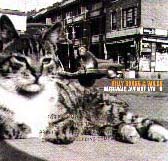By Tony Bonyata
"Woody Guthrie was the first alternative musician," claims modern political protest singer Billy Bragg, who knows a thing or two himself about the singing / songwriting genius of Guthrie.An original folk hero, Guthrie was also one of the true musical rebels of our country. He transformed the folk song into his own soap box for social protest - writing and recording hundreds of numbers that were drenched in the sweat of America's working class' brow. He traveled across the country, collecting stories and tales of what he saw and returned to his house on Mermaid Avenue on Coney Island to set his American experiences to music.
 His lyrical output, however, proved too prolific for his own life. He slowly succumbed to Huntington's Disease before ever getting the chance to compose music for many of them.
His lyrical output, however, proved too prolific for his own life. He slowly succumbed to Huntington's Disease before ever getting the chance to compose music for many of them.Thanks to his daughter and keeper of the Woody Guthrie Archives in New York City, Nora Guthrie, the rebellious spirit and clever stories of our past that her father documented with a scathing wit are now being unleashed on a new America.
Nora has given a stockpile of her father's lyrics to post-modern folkie Billy Bragg and American pop darlings Wilco to score their own music to. These lyrics, written between 1939 and 1955, have never been set to music before. "She really wanted us to bring this alive, but also bring our own influences on board," claims Bragg. "I think one of the main reasons for the success of the project is that we could be who we wanted to be - Billy Bragg and Wilco. It's not Woody's record and it's not our record."
This collaborative effort yielded the fruitful and folkie 1998 release Mermaid Avenue and has now branched out on their latest follow-up Mermaid Avenue, Volume 2.
Where the first album featured a rawer, folkier sound to showcase a broader view of Guthrie's work, Volume 2 seems to dig as deeply into Bragg and Wilco's own modern ideals of American music as it does into Guthrie¹s brilliant lyricism.
The gritty, rural feel of Guthrie is convincingly documented by Bragg on the dark, country number "Hot Rod Hotel," while a twisted banjo and slashing guitar gets tangled up around his obstreperous, whiskey-soaked rantings on "Meanest Man."
"There's a black wind blowing in the cotton field, honey," Bragg bleakly sings as if standing next to Guthrie on a desolate, dusty crop on the stark "Black Wind Blowing."
The songs written and performed by Wilco, and accompanied by Bragg, such as the bouncy, Dylan-esque folk-pop of "Airline To Heaven," "Feed Of Man," with its earthy blues rhythm, and "Secret Of The Sea," which features the rich melodies that made Wilco's last album, Summerteeth, so indelible, will appeal to younger alternative rock fans in search of American roots music.
The cute, finger poppin¹ country-rock of "Aginst Th' Law," and "Joe DiMaggio Done It Again," with it's bluegrass banjos and reeling fiddles are both reminiscent of a time when hitting a ball out of the park was a reason for the nation to celebrate.
Wilco's singer / songwriter Jeff Tweedy composes a tuneful, country dirge around Guthrie's "Blood Of The Lamb," and weaves a beautifully tender melody on the poignant folk-rock "Remember The Mountain Bed," before guest vocalist Natalie Merchant tucks us in with "I Was Born," a gentle, lilting lullaby composed by both Bragg and Guthrie.
With such an inventive, exhilarating collaboration between young and old on Guthrie, Bragg and Wilco¹s Mermaid Avenue, Volume 2 one can only hope that Woody's daughter will donate enough material for a third volume.